- Home
- Pittacus Lore
The Lost Files: Six's Legacy Page 2
The Lost Files: Six's Legacy Read online
Page 2
She cradles my head, wipes the sweat from my brow. The water and the salve have taken the sharpest edge off the pain, but it still hurts as bad as the first time, maybe worse. But I won’t comment on it. I can see that my pain, and this evidence of Two’s passing, is tormenting Katarina enough.
“We’ll be okay,” says Katarina. “There are still many others. . . .”
I know she is speaking carelessly. She doesn’t mean to put the lives of the Garde before me—Three, Four, and Five—ahead of my own. She is just grasping for consolation. But I won’t let it pass.
“Yeah. It’s so great others have to die before me.”
“That’s not what I meant.” I can see my words have upset her.
I sigh, putting my head against her shoulder.
Sometimes, in my heart of hearts, I use a different name for Katarina. Sometimes to me she’s not Katarina or Vicky or Celeste or any of her other aliases. Sometimes—in my mind—I call her “Mom.”
CHAPTER FOUR
We’re on the road an hour later. Katarina white-knuckles the steering wheel of our truck through country roads, cursing her choice of hideaway. These roads are too rough and dusty to go faster than forty miles per hour, and what we both want is the speed of a highway. Anything to put as much distance as possible between us and our now abandoned shack. Katarina did what she could to scrub our tracks, but if what we imagine is true—the Mogadorians killing Two seconds after we saw her fatal blog post—then they moved fast, and they could be racing towards our abandoned home right now.
As I watch the fields and the hills pass through the passenger window, I realize that they could already be at the shack. In fact, they could already be following us on the road. Feeling like a coward as I do it, I crane my neck and look through the rear window, through the dust trail our truck kicks up in our wake.
No cars trail us.
Not yet, at least.
We packed light. The truck was already loaded with a first-aid kit, a lightweight camping set, bottled water, flashlights, and blankets. Once I was ready to walk again, all I had to do was pick out a few items of clothing for the road and retrieve my Chest from the lockbox under the shack.
The panic of flight gave me little time to feel the searing pain of my second scar, but it returns to me now, lacerating and insistent.
“We shouldn’t have responded,” says Katarina. “I don’t know what we were thinking.”
I look at Katarina for signs of judgment on her face—after all, I’m the one who insisted we write back—and I’m relieved to find none. All I see is her fear, and her determination to get us as far away as possible.
I realize that in the confusion and haste to flee I forgot to notice if we turned north or south at the crossing at the edge of Puerto Blanco.
“U.S.?” I ask.
Katarina nods, pulling our most recent passports from the inside pocket of her army jacket, tossing mine into my lap. I flip it open and peer at my new name.
“Maren Elizabeth,” I say aloud. Katarina puts a lot of time into her forgeries, though I usually complain about the names she chooses for me. When I was eight and we were moving to Nova Scotia, I begged and begged to be named Starla. Katarina vetoed the suggestion. She thought it was too “attention getting,” too exotic. I almost laugh to think about it now. A Katarina in Mexico is about as exotic as you can get. And of course she’s keeping it. Katarina has grown attached to her own name. Sometimes I suspect that Cêpans aren’t so different from parents after all.
Maren Elizabeth . . . it’s no Starla, but I like how it sounds.
I reach down and cradle my calf, just above the throbbing scars on my ankle. By squeezing my calf I can muffle the pain of my sizzled flesh.
But as the pain fades, the fear returns. The fear of our present situation, the horror of Two’s death. I decide to let go of my calf, and I let my leg burn.
Katarina refuses to stop the car for anything but gas and pee breaks. It’s a long trip, but we have ways to pass the time. Mostly we play Shadow, a game that Katarina made up during our previous travels, out of our desire to keep training even when we couldn’t do physical drills.
“A Mogadorian scout races at you from two o’clock, wielding a twenty-inch blade in his left arm. He swings.”
“I crouch,” I say. “Dodge left.”
“He swings around, the blade above your head.”
“From the ground, a kick to the groin. A leg sweep, from his right side to his left.”
“On his back, but he grabs your arm.”
“I let him. I use the force of his grip to swing my legs free, up, and then down to his face. Step on his face, pull my hand free.”
It’s a strange game. It forces me to separate the physical from reality, to fight with my brain and not my body. I used to complain about games of Shadow, saying it was all made up, that it wasn’t real. Fighting was fists, and feet, and heads. It wasn’t brains. It wasn’t words.
But the more Shadow we played, the better I got at drills, especially hand-to-hand drills with Katarina. I couldn’t deny that the game made good practice. It made me a better fighter. I have come to love it.
“I run,” I say.
“Too late,” she says. I almost complain, knowing what’s coming. “You forgot about the sword,” she says. “He’s already swung it up and nicked your flank.”
“No he didn’t,” I say. “I froze his sword and shattered it like glass.”
“Oh did you, now?” Katarina is tired, eyes bloodshot from ten straight hours of driving, but I can see I’m amusing her. “I must’ve missed that part.”
“Yeah,” I say, starting to grin myself.
“And how’d you pull off that feat?”
“My Legacy. It just kicked in. Turns out, I can freeze stuff.”
This is make-believe. I have yet to develop my Legacies, and I have no idea what they’ll be when they arrive.
“That’s a good one,” says Katarina.
CHAPTER FIVE
We crossed the U.S. border hours back, without a hitch. I have never understood how Katarina manages to make such incredible forgeries.
Katarina is pulling us into a dusty pit stop off the highway. There’s a tiny, single-story motel, an old-fashioned and decrepit diner, and a gas station, newer and brighter than the other two buildings.
It is barely dusk when we step out of the truck. The faintest pink of sunrise creeps over the horizon, just enough to add a strange hue to our flesh as we stumble out onto the gravel.
Katarina curses, getting back into the car. “Forgot to get gas,” she says. “Wait here.”
I do as I’m told, watching her pull the truck from the motel parking lot towards one of the pumps. We have agreed to rest up at the motel for a day or two, to recover from our grueling, fifteen-hour drive and the shock of recent events. But even though we’ll be here for some time, the tank must be filled: that’s Katarina’s policy.
“Never leave an empty tank,” she says. I think she says it as much to remind herself as to educate me.
It’s a good policy. You never know when you’ll have to leave in a hurry.
I watch Katarina pull up to the pump and start filling the car.
I examine my surroundings. Through the front window of the diner across the lot, I can see a few grizzled-looking truckers eating. Through the scent of exhaust and the faint odor of gas fumes from the pumps, I can smell breakfast food in the air.
Or maybe I’m just imagining it. I am incredibly hungry. My mouth waters at the thought of breakfast.
I turn my back on the diner, trying not to think about food, and look at the town on the other side of the fence from the pit stop. Houses only a step up from clapboard shacks. A ragged, desolate place.
“Hello, miss.” Startled, I whizz around to see a tall, gray-haired cowboy strutting past. It takes me a second to realize that he’s not starting a conversation, merely being polite as he passes. He gives a little nod of his ten-gallon hat and proceeds past me int
o the diner.
My heart rate is up.
I had forgotten this aspect of the road. When we’re settled in a place, even a remote one like Puerto Blanco, we get to know the local faces. We know, more or less, who to trust. I’ve never seen a Mogadorian in my life, but Katarina says that most of the Mogadorians look like anyone else. After what happened to One and Two, I feel a deep unease all around me, a new alertness. A roadside rest stop is especially troublesome in that everyone is a stranger to everyone, so no one raises any eyebrows, not really. For us that means anyone could be a threat.
Katarina has parked the car and approaches me with a weary grin.
“Eat or sleep?” she asks. Before I can answer, she’s raised her hand hopefully. “My vote for sleep.”
“My vote is to eat.” Katarina deflates at this. “You know eat beats sleep,” I say. “Always does.” It is one of our rules of the road, and Katarina quickly accepts the verdict.
“Okay, Maren Elizabeth,” she says. “Lead the way.”
CHAPTER SIX
The diner is humid with grease. It is barely six a.m. but almost all of the booths are full, mostly with truckers. While I wait for our food I watch these men shovel hearty, well-syruped forksful of breakfast meat—sausage, bacon, scrapple—into their mouths. When my food finally comes I find myself more than holding my own. Three pancakes, four strips of bacon, a side of hash, one tall OJ.
I finish with a rude belch that Katarina is too tired to chastise me for.
“Do you think . . . ?” I ask.
Katarina laughs, anticipating my question. “How is that possible?”
I shrug. She nods, and calls the waitress over. With a guilty grin, I order another stack of pancakes.
“Well,” says the waitress, with a dry smoker’s cackle, “your little girl sure can put it down.” The waitress is an older woman, with a face so lined and haggard you could mistake it for a man’s.
“Yes, ma’am,” I say. The waitress leaves.
“Your appetite will never cease to amaze me,” Katarina says. But she knows the reason for it. I train constantly, and though I’m only thirteen years old I already have the tightly muscled body of a gymnast. I need a lot of fuel, and am not ashamed of my appetite.
Another customer enters the crowded diner.
I notice the other men give him a suspicious glance as he makes his way to a booth in the rear. They looked at me and Katarina with similar suspicion when we first entered. I took this place for a way station, filled with strangers, but apparently some strangers are worthy of suspicion and others aren’t. Katarina and I are doing our best, dressed in generic American mall clothes: T-shirts and khaki shorts. I can see why we stand out—apparently they have a different definition of “generic” here in the far reaches of West Texas.
This other stranger is harder to figure, though. He’s dressed the part, more or less: wearing one of those Texas ties, with the dangly strands of black leather. And like the rest of the men here, he’s wearing boots.
But his clothes seem somehow out-of-date, and there’s something creepy about his thin black mustache: it looks straight at first glance, but the more I consider it, something about it just seems crooked.
“It’s impolite to stare.” Katarina, chiding me again.
“I wasn’t staring,” I lie. “I was looking, with interest.”
Katarina laughs. She’s laughed more in the past twenty-four hours than she has in months. This new Katrina is going to take some getting used to.
Not that I mind.
I stretch out luxuriantly on the hotel bed while Katarina showers in the bathroom. The sheets are cheap, polyester or rayon, but I’m so tired from the road they may as well be silk.
When Katarina first pulled the sheets down we found a live earwig under the pillow, which grossed her out but didn’t bother me.
“Kill it,” she begged, covering her eyes.
I refused. “It’s just an insect.”
“Kill it!” she begged.
Instead, I swept it off the bed and hopped into the cool sheets. “Nope,” I said stubbornly.
“Fine,” she said, and went to shower. She turned the faucets on, but stepped out of the bathroom again a moment later. “I worry—” she started.
“About what?” I asked.
“I worry that I haven’t trained you well.”
I rolled my eyes. “’Cause I won’t kill a bug?!”
“Yes. No, I mean, it’s what got me thinking. You need to learn to kill without hesitation. I haven’t even taught you to hunt rodents, let alone Mogadorians . . . you’ve never killed anything—”
Katarina paused, the water still running behind her. Thinking.
I could tell she was tired, lost in a thought. She gets like that sometimes, if we’ve been training too gruelingly. “Kat,” I said. “Go shower.”
She looked up, her reverie broken. She chuckled and closed the door behind her.
Waiting for her to finish, I turned on the TV from the bed. The previous tenant had left it on CNN and I’m greeted with the site of helicopter footage of the “event” in England. I watch only long enough to learn that both the press and English authorities are confused as to what exactly happened yesterday. I’m too tired to think about this; I’ll get the details later.
I shut off the TV and lay back on the bed, eager for sleep to take me.
Katarina steps out of the bathroom moments later, wearing a robe and brushing out her hair. I watch her through half-closed eyes.
There is a knock on the door.
Katarina drops her brush on the bureau.
“Who is it?” she asks.
“Manager, miss. I brought ya some fresh towels.”
I’m so annoyed by the interruption—I want to sleep, and it’s pretty obvious we don’t need fresh towels since we only just got to the room—that I propel myself right off the bed, barely thinking.
“We don’t need any,” I say, already swinging the door open.
I just have time to hear Katarina say, “Don’t—” before I see him, standing before me. The crooked mustache man.
The scream catches in my throat as he enters the room and shuts the door behind him.
CHAPTER SEVEN
I react without thinking, pushing him towards the door, but he flings me back easily, against the bed. I clutch my chest and realize with horror that my pendant is out from under my shirt. In plain view.
“Pretty necklace,” he growls, his eyes flashing with recognition.
If he had any doubt about who I am, it is long gone.
Katarina charges forward but he strikes her hard. She crashes against the TV set, smashing the screen with a bare elbow, and falls to the ground.
He pulls something from his waist—a long, thin blade—and raises it so quickly I don’t even have time to stand. I see only the flash of his blade as he swings it down—straight down, like a railroad spike—into my brain.
My head floods instantly with warmth and light.
This is what death feels like, I think.
But no. The pain doesn’t come.
I look up—how can I see? I think. I’m dead. But I do see, and realize that I’m covered, from head to toe, in hot red blood. The Crooked Mustache Man still has his arm outstretched, his mouth is still frozen in victory, but his skull has been split open, as if by a knife, and his blood is spilling out across my knees.
I hear Katarina wail—it’s such a primal noise that I can’t tell if it’s a cry of grief or a scream of relief—as the man, emptied of blood, turns quickly to dust, collapsing in on himself as an ashy heap.
Before I can take a breath, Katarina is up, shedding her robe and throwing on clothes, grabbing our bags.
“He died,” I say. “I didn’t.”
“Yes,” Katarina replies. She puts on a white blouse, which she instantly ruins with the blood from her elbow, shredded from the TV screen. She throws it out, blots the blood from her elbow with a towel, and puts on another shirt.
I feel like a child, speechless, immobile, covered in blood on the floor.
That was it—the moment I’ve been training for my whole life—and all I managed was a feeble, easily deflected shove before getting tossed aside and stabbed.
“He didn’t know,” I say.
“He didn’t know,” she says.
What he didn’t know is that any harm inflicted on me out of order would instead be inflicted upon my attacker. I was safe from direct attack. I knew it, but I also didn’t really know it. When he stabbed me in the head, I thought I was dead. It took seeing it to believe it.
I reach up and touch my scalp. The flesh there is unbroken, it’s not even damp. . . .
There’s the proof. We are protected by the charm. As long as we stay apart from each other, we can only be killed in the order of our number.
I realize his blood has now turned to dust along with his flesh. I am no longer drenched in it.
“We have to go.” Katarina has shoved my Chest into my arms, her face pressed right up to mine. I realize I’ve spaced out, gone to a place inside my own head, reeling from the shock of what just happened. I can tell from the way she says it that this is the third or fourth time she’s repeated it, though I am only just hearing her.
“Now,” she says.
Katarina drags me by the wrist, her bag slung over her shoulder. The hot asphalt of the parking lot burns the soles of my shoeless feet as we rush outside towards the truck. I carry my Chest, which feels heavy in my arms.
I have been preparing for battle my whole life, and now that it’s come all I want is to sleep. My heels drag, my arms are heavy.
“Faster!” says Katarina, pulling me along. The truck’s unlocked. I get into the passenger seat as Katarina tosses our stuff in the bed of the truck and hops into the driver’s seat. No sooner has she closed her door than I see a man racing towards us.

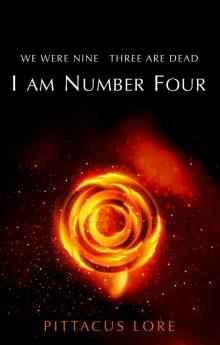 I Am Number Four
I Am Number Four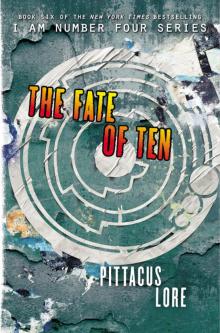 The Fate of Ten
The Fate of Ten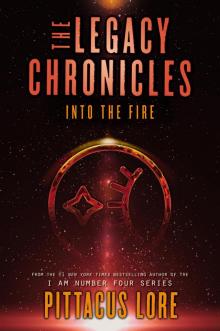 The Legacy Chronicles - Into the Fire
The Legacy Chronicles - Into the Fire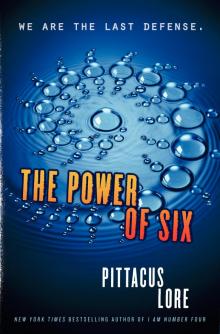 The Power of Six
The Power of Six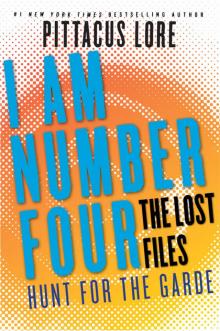 Hunt for the Garde
Hunt for the Garde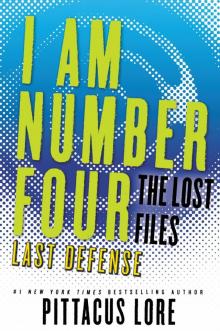 Last Defense
Last Defense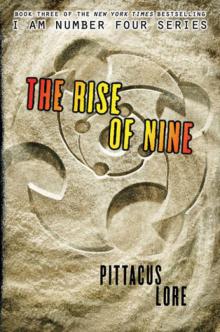 The Rise of Nine
The Rise of Nine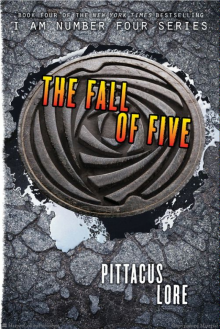 The Fall of Five
The Fall of Five The Fugitive
The Fugitive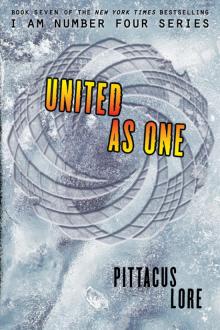 United as One
United as One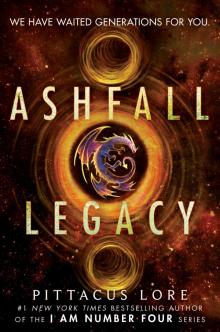 Ashfall Legacy
Ashfall Legacy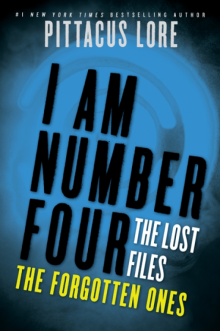 The Forgotten Ones
The Forgotten Ones Fugitive Six
Fugitive Six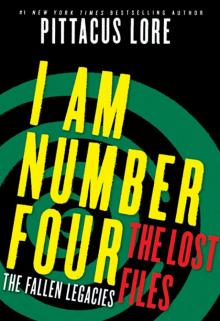 The Fallen Legacies
The Fallen Legacies![[Lorien Legacies 04.95] The Lost Files: Five's Betrayal Read online](http://i1.bookreadfree.com/28/lorien_legacies_04_95_the_lost_files_fives_betrayal_preview.jpg) [Lorien Legacies 04.95] The Lost Files: Five's Betrayal
[Lorien Legacies 04.95] The Lost Files: Five's Betrayal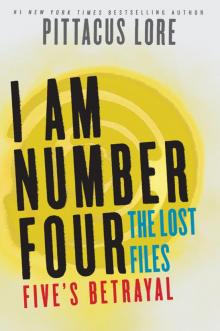 Five's Betrayal
Five's Betrayal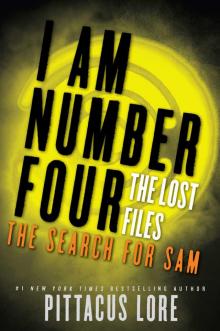 The Search for Sam
The Search for Sam![[Lorien Legacies 04.85] The Lost Files: The Forgotten Ones Read online](http://i1.bookreadfree.com/28/lorien_legacies_04_85_the_lost_files_the_forgotten_ones_preview.jpg) [Lorien Legacies 04.85] The Lost Files: The Forgotten Ones
[Lorien Legacies 04.85] The Lost Files: The Forgotten Ones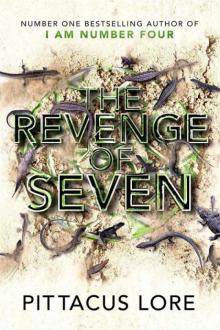 The Revenge of Seven
The Revenge of Seven![[Lorien Legacies 06.3] The Lost Files: Hunt for the Garde Read online](http://i1.bookreadfree.com/07/lorien_legacies_06_3_the_lost_files_hunt_for_the_garde_preview.jpg) [Lorien Legacies 06.3] The Lost Files: Hunt for the Garde
[Lorien Legacies 06.3] The Lost Files: Hunt for the Garde![[Lorien Legacies 04.0] The Fall of Five Read online](http://i1.bookreadfree.com/03/lorien_legacies_04_0_the_fall_of_five_preview.jpg) [Lorien Legacies 04.0] The Fall of Five
[Lorien Legacies 04.0] The Fall of Five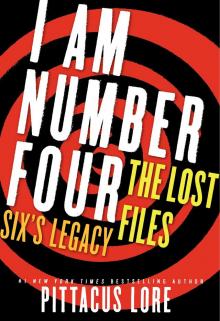 Nines Legacy
Nines Legacy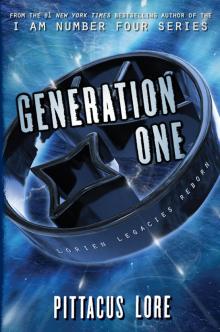 Generation One LLR
Generation One LLR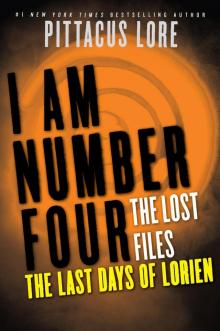 The Last Days of Lorien
The Last Days of Lorien![[Lorien Legacies 05.1] The Lost Files: The Fugitive Read online](http://i1.bookreadfree.com/i/03/14/lorien_legacies_05_1_the_lost_files_the_fugitive_preview.jpg) [Lorien Legacies 05.1] The Lost Files: The Fugitive
[Lorien Legacies 05.1] The Lost Files: The Fugitive![[Lorien Legacies 06.0] The Fate of Ten Read online](http://i1.bookreadfree.com/07/lorien_legacies_06_0_the_fate_of_ten_preview.jpg) [Lorien Legacies 06.0] The Fate of Ten
[Lorien Legacies 06.0] The Fate of Ten![[Lorien Legacies 06.2] The Lost Files: Last Defense Read online](http://i1.bookreadfree.com/08/lorien_legacies_06_2_the_lost_files_last_defense_preview.jpg) [Lorien Legacies 06.2] The Lost Files: Last Defense
[Lorien Legacies 06.2] The Lost Files: Last Defense![[Lorien Legacies 04.9] The Lost Files: Five's Legacy Read online](http://i1.bookreadfree.com/i/03/16/lorien_legacies_04_9_the_lost_files_fives_legacy_preview.jpg) [Lorien Legacies 04.9] The Lost Files: Five's Legacy
[Lorien Legacies 04.9] The Lost Files: Five's Legacy The Navigator
The Navigator![[Lorien Legacies 04.94] The Lost Files: Return to Paradise Read online](http://i1.bookreadfree.com/i/03/13/lorien_legacies_04_94_the_lost_files_return_to_paradise_preview.jpg) [Lorien Legacies 04.94] The Lost Files: Return to Paradise
[Lorien Legacies 04.94] The Lost Files: Return to Paradise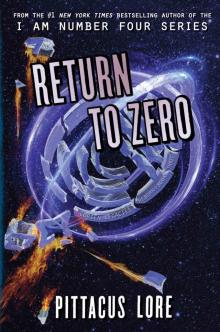 Return to Zero
Return to Zero![[Lorien Legacies 01.5] The Lost Files: The Fallen Legacies Read online](http://i1.bookreadfree.com/09/lorien_legacies_01_5_the_lost_files_the_fallen_legacies_preview.jpg) [Lorien Legacies 01.5] The Lost Files: The Fallen Legacies
[Lorien Legacies 01.5] The Lost Files: The Fallen Legacies![[Lorien Legacies 05.7] The Lost Files: The Guard Read online](http://i1.bookreadfree.com/i/03/13/lorien_legacies_05_7_the_lost_files_the_guard_preview.jpg) [Lorien Legacies 05.7] The Lost Files: The Guard
[Lorien Legacies 05.7] The Lost Files: The Guard![[Lorien Legacies 06.1] The Lost Files: Legacies Reborn Read online](http://i1.bookreadfree.com/i/03/13/lorien_legacies_06_1_the_lost_files_legacies_reborn_preview.jpg) [Lorien Legacies 06.1] The Lost Files: Legacies Reborn
[Lorien Legacies 06.1] The Lost Files: Legacies Reborn![[Lorien Legacies 03.0] The Rise of Nine Read online](http://i1.bookreadfree.com/10/lorien_legacies_03_0_the_rise_of_nine_preview.jpg) [Lorien Legacies 03.0] The Rise of Nine
[Lorien Legacies 03.0] The Rise of Nine![[Lorien Legacies 02.0] The Power of Six Read online](http://i1.bookreadfree.com/i/03/14/lorien_legacies_02_0_the_power_of_six_preview.jpg) [Lorien Legacies 02.0] The Power of Six
[Lorien Legacies 02.0] The Power of Six![[Lorien Legacies 04.6] The Lost Files: The Search for Sam Read online](http://i1.bookreadfree.com/i/03/17/lorien_legacies_04_6_the_lost_files_the_search_for_sam_preview.jpg) [Lorien Legacies 04.6] The Lost Files: The Search for Sam
[Lorien Legacies 04.6] The Lost Files: The Search for Sam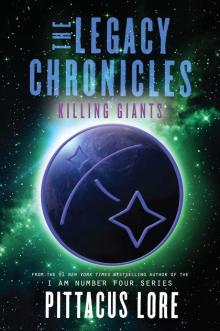 The Legacy Chronicles: Killing Giants
The Legacy Chronicles: Killing Giants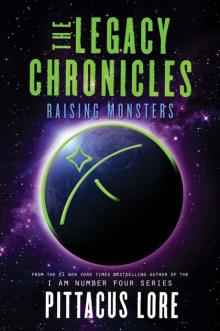 The Legacy Chronicles: Raising Monsters
The Legacy Chronicles: Raising Monsters![[Lorien Legacies 05.4] The Lost Files: The Navigator Read online](http://i1.bookreadfree.com/i/03/17/lorien_legacies_05_4_the_lost_files_the_navigator_preview.jpg) [Lorien Legacies 05.4] The Lost Files: The Navigator
[Lorien Legacies 05.4] The Lost Files: The Navigator![[Lorien Legacies 07.0] United as One Read online](http://i1.bookreadfree.com/i/03/18/lorien_legacies_07_0_united_as_one_preview.jpg) [Lorien Legacies 07.0] United as One
[Lorien Legacies 07.0] United as One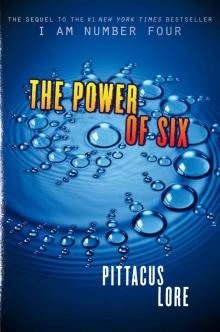 The Power of Six (I Am Number Four)
The Power of Six (I Am Number Four)![[Lorien Legacies 03.5] The Lost Files: Nine's Legacy Read online](http://i1.bookreadfree.com/i/03/18/lorien_legacies_03_5_the_lost_files_nines_legacy_preview.jpg) [Lorien Legacies 03.5] The Lost Files: Nine's Legacy
[Lorien Legacies 03.5] The Lost Files: Nine's Legacy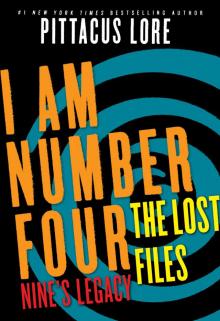 I Am Number Four: The Lost Files: Nine’s Legacy
I Am Number Four: The Lost Files: Nine’s Legacy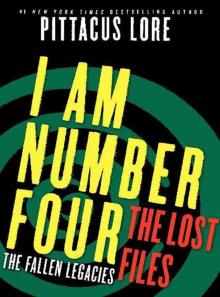 The Lost Files: The Fallen Legacies (i am number four)
The Lost Files: The Fallen Legacies (i am number four)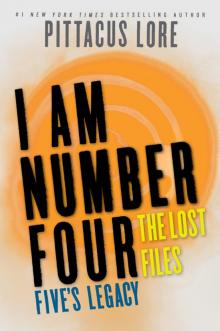 Five's Legacy
Five's Legacy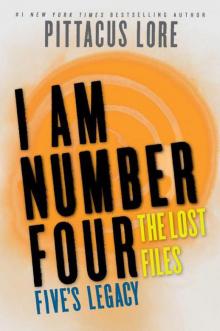 I Am Number Four: The Lost Files: Five's Legacy
I Am Number Four: The Lost Files: Five's Legacy![[Lorien Legacies 05.0] The Revenge of Seven Read online](http://i1.bookreadfree.com/i1/03/30/lorien_legacies_05_0_the_revenge_of_seven_preview.jpg) [Lorien Legacies 05.0] The Revenge of Seven
[Lorien Legacies 05.0] The Revenge of Seven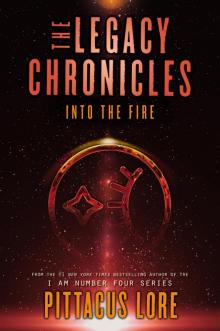 The Legacy Chronicles
The Legacy Chronicles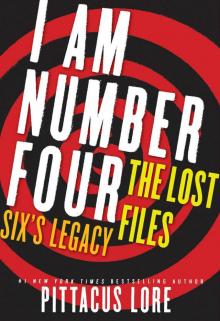 The Lost Files: Six's Legacy
The Lost Files: Six's Legacy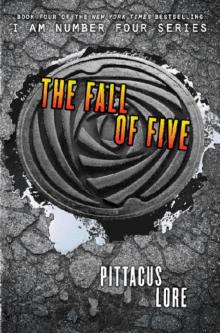 The Fall of Five (I Am Number Four)
The Fall of Five (I Am Number Four)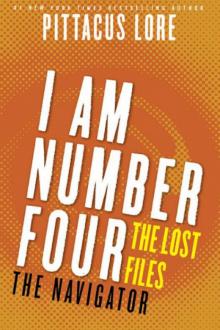 The Lost Files: The Navigator
The Lost Files: The Navigator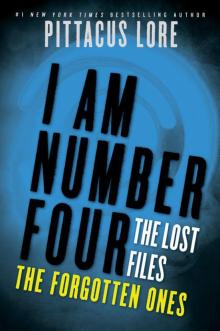 I Am Number Four: The Lost Files: The Forgotten Ones
I Am Number Four: The Lost Files: The Forgotten Ones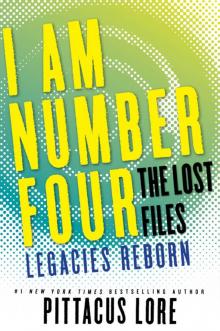 Legacies Reborn
Legacies Reborn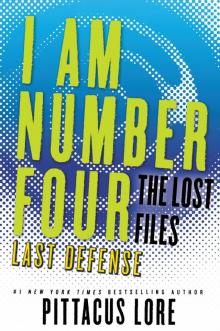 I Am Number Four: The Lost Files: Last Defense
I Am Number Four: The Lost Files: Last Defense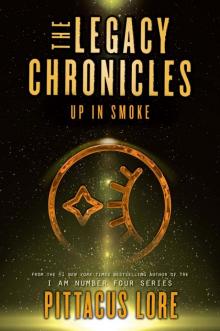 The Legacy Chronicles_Up in Smoke
The Legacy Chronicles_Up in Smoke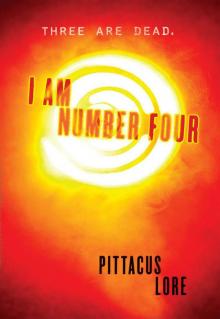 I Am Number Four ll-1
I Am Number Four ll-1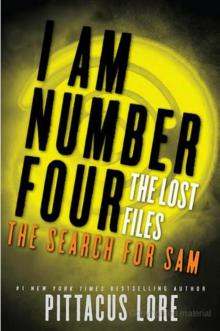 The Search for Sam lltlf-4
The Search for Sam lltlf-4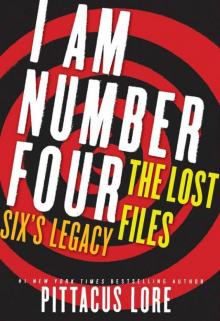 The Lost Files: Six's Legacy (lorien legacies)
The Lost Files: Six's Legacy (lorien legacies)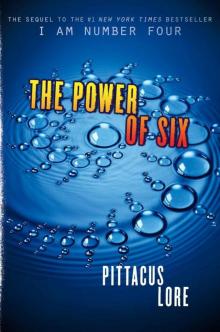 The Power of Six tll-2
The Power of Six tll-2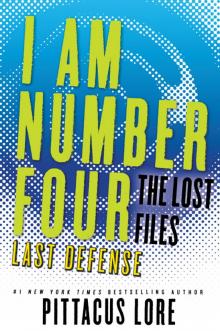 I Am Number Four: The Lost Files #14
I Am Number Four: The Lost Files #14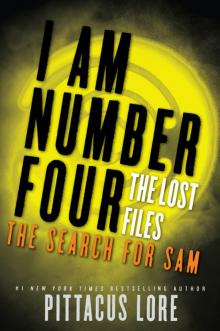 I Am Number Four: The Lost Files: The Search for Sam
I Am Number Four: The Lost Files: The Search for Sam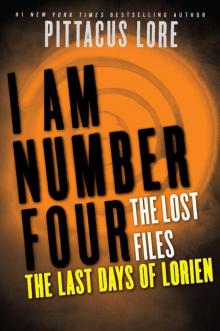 I Am Number Four: The Lost Files: The Last Days of Lorien
I Am Number Four: The Lost Files: The Last Days of Lorien